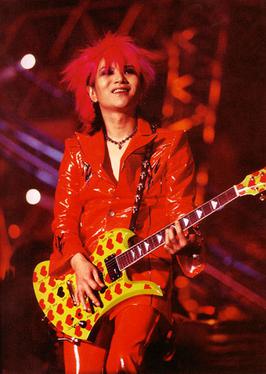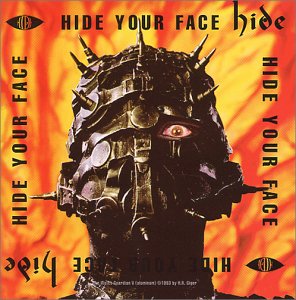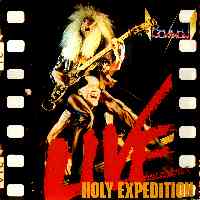
Hideto Matsumoto, known professionally as hide, was a Japanese musician, singer, songwriter, and record producer. He achieved international fame as the lead guitarist of the rock band X Japan from 1987 to 1997 and a solo artist from 1993 onward. He also formed the United States-based rock supergroup Zilch in 1996.

Taiji Sawada, also known mononymously as Taiji, was a Japanese musician and songwriter. He is best known as the former bassist of the rock band X Japan. X Japan rose to prominence in the late 1980s and early 1990s, credited as founders of the Japanese visual kei movement. After leaving X Japan in January 1992, Taiji went on to work with many other bands, including Loudness and D.T.R.
Elephant Kashimashi, sometimes abbreviated as Elekashi, is a Japanese rock band from Kita, Tokyo, formed in 1981. It has consisted of vocalist and guitarist Hiroji Miyamoto, guitarist Toshiyuki Ishimori, bassist Seiji Takamidori and drummer Yoshiyuki Tominaga since 1986.

sympathy is Hitomi Takahashi's first album to be released under gr8! records, a division of Sony Records. The album was released on March 1, 2006, and three singles preceded it.

Rock the House Live! is a live album released by the American hard rock band Heart in 1991. It was recorded at The Centrum, Worcester, MA, USA on November 28, 1990. The band performed a set of 22 songs ; but only 14 were used on the album, missing most of their recent successful singles "These Dreams", "Never", "Alone", "What About Love", "All I Wanna Do Is Make Love to You", trying to demonstrate that Heart wasn't a band of ballad hits, but instead an arena rock staple. Instead of filling the album either with their early hard rock hits or their later pop ones, it is instead composed of mainly less familiar songs from recent albums, and a new cover.

"Tears" is the ninth single by the Japanese rock band X Japan, released on November 10, 1993.

"Endless Rain" is the fourth single released by Japanese heavy metal band X Japan on December 1, 1989. It is their second single on a major record label and reached number 3 on the Oricon chart.

Hide Your Face is the debut album by Japanese musician hide, released on February 23, 1994. It reached number 1 on the Oricon Albums Chart and was certified Double Platinum by the RIAJ for sales over 500,000 copies. It was named one of the top albums from 1989-1998 in a 2004 issue of the music magazine Band Yarouze.
Kyoji Yamamoto is a Japanese musician, singer-songwriter, and record producer who is the leader of the hard rock/heavy metal bands Bow Wow and Wild Flag. He is known for his skillful guitar playing, with former bandmate Neil Murray calling him one of the top Japanese guitarists, and was one of the first hard rock guitarist to use the tapping technique. Yamamoto often uses 24-fret Yamaha HR guitars.
Zi:Kill was a Japanese visual kei rock band active from 1987 to 1994. The core members were vocalist Tusk, bassist Seiichi and guitarist Ken. Zi:Kill achieved moderate success, with their three major label studio albums reaching the top ten on the Oricon chart. They were featured in a chapter of Karl Taro Greenfeld's novel Speed Tribes that documents the writer's time spent with the band and the events that nearly caused their break up.

Image is the second studio album by Japanese rock band Luna Sea, released on May 21, 1992. It is their major label debut on MCA Victor, reached number nine on the Oricon Albums Chart, and charted for 14 weeks. In 2000, it was certified Platinum by the RIAJ for sales over 400,000.

Shock Waves is a compilation album by Japanese heavy metal band Vow Wow. The album was released in 1986 in the USA and contains most of the songs from the Tony Platt-produced album III (1986), with the addition of "Beat of Metal Motion" and "You Know What I Mean" from the albums of 1984 and 1985 respectively.

Holy Expedition is the second live album by Japanese heavy metal band Bow Wow.

Ai no Wakusei is the only solo album released by Japanese singer Atsushi Sakurai, lead vocalist of the rock band Buck-Tick. It was released by Victor Entertainment on June 23, 2004. In addition to providing lead vocals, Sakurai wrote the lyrics to every song, while the music was composed and performed by many different collaborators. Contributors include, Wayne Hussey, Robin Guthrie, Yasuyuki Okamura, and Theatre Brook frontman Taiji Sato. Three singles were released to promote the album. Ai no Wakusei reached number 15 on the Oricon Albums Chart, and charted for four weeks.

Color was a Japanese punk rock band formed in Osaka in 1985 by vocalist Dynamite Tommy, who founded the Free-Will record label a year later. They are considered to be important to the formation of visual kei, with the phrase "X of the East, Color of the West" (東のX、西のCOLOR) comparing the importance of the Kansai band to that of X Japan in Kantō. Their debut album Gekitotsu was named one of the top albums from 1989–1998 in a 2004 issue of the music magazine Band Yarouze.
Japanese metal is heavy metal music from Japan. The country's first metal bands formed in the mid-to-late 1970s. The number of acts increased significantly in the next decade, but only a few saw their material released internationally, including Europe and North America with their pre-established metal bases. Domestic metal saw its commercial peak in Japan in the late 1980s and early 1990s, with the top acts selling millions of records. Many metal bands from the visual kei scene toured and gained recognition in the West in the 2000s. The 2010s saw a boom of all-female metal bands form and gain mainstream attention.

Band-Maid is a Japanese rock band formed in 2013, consisting of singer Saiki Atsumi, guitarist/singer Miku Kobato, lead guitarist Kanami Tōno, bassist Misa, and drummer Akane Hirose. The band combines a rock sound with a maid image modeled on Japanese maid cafés. They are currently signed to Pony Canyon. Their most recent studio recording, the EP Unleash, was released in September 2022.
Japanese rock, sometimes abbreviated to J-rock, is rock music from Japan. Influenced by American and British rock of the 1960s, the first rock bands in Japan performed what is called group sounds, with lyrics almost exclusively in English. Folk rock band Happy End in the early 1970s are credited as the first to sing rock music in the Japanese language. Punk rock bands Boøwy and The Blue Hearts and hard rock/heavy metal groups X Japan and B'z led Japanese rock in the late 1980s and early 1990s by achieving major mainstream success.

World Domination is the fifth studio album by Japanese all-female rock band Band-Maid. It was released on February 14, 2018, and was supported with the World Domination Tour 2018. Music videos were made for the single "Daydreaming", the lead track "Domination" and the last track "Dice". The album debuted at number nine on the Japanese Oricon Albums Chart, selling 8,140 copies in its first week.

"Julian" is the tenth single by Japanese band Princess Princess. Written by Kanako Nakayama and Kaori Okui, the single was released by Sony Records on November 21, 1990. It became their fourth of five consecutive No. 1 singles on Oricon's singles chart.














